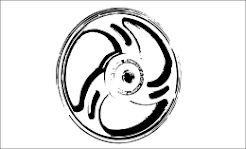Suggested topic :Locomotion in mobile robotics
Wheeled mobile robots:
The wheel is one of the widely used locomotion techniques in mobile
robotics. as its efficiency and simplicity of mechanical implementation. and
in addition to these qualities body balancing is not a constraint in general
wheeled mobile robot scenarios, because in most cases the wheeled robots are
designed as all wheels are in contact with the ground so just 3 wheels are
enough to ensure stability.
Wheel Design:
Wheel designs are classified into 4 types in general.
1. Standard wheel:
Two degrees of freedom -->rotation around the wheel
axis and contact point,
Having a primary axis of rotation so it is
highly directional.
-To move in a different direction the wheel
should first steer along a vertical axis .
2. Caster wheel:
two degrees of freedom rotation around an offset steering joint.
3. Swedish wheel:
Three degrees of freedom -->rotation around the wheel axis, around the roller, around the contact point.Functions as a standard wheel with Low resistance in direction change.
4. Ball or spherical wheel:
multi-degree of freedom Complete Omni-directional.
Requirement of suspension system :
Regardless of the type of wheel, the robot is designed for
multiple /all-terrain fields and with more than 3 wheels requires a suspension
system to maintain wheel contact with the ground.
The Geometry of the wheel :
The term wheel Geometry is used to represent wheel arrangements.
wheel
geometry = How we arrange wheels in a system
The wheel geometry and type
of wheel are closely linked to each other.
so, when we design the
locomotion mechanism of a robot we have to decide on these two parts
simultaneously.
The fundamental characteristics like
maneuverability, controllability, and stability of robots
depend on the combination of wheel geometry and type of wheel.
Maneuverability:
Capability of being steered or directed.
Controllability:
Refers to the ability to drive a system from one state to another.
Dynamic stability:
The measure of the ability of a robot to maintain its balance while in motion.
****
Read:


